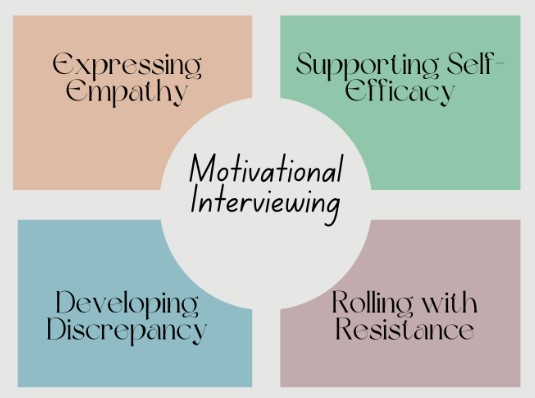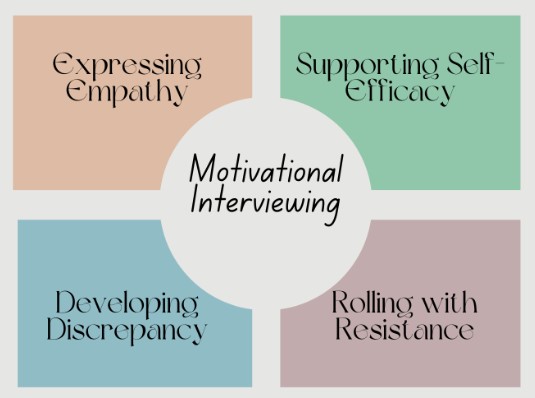-
-
-
Tổng tiền thanh toán:
-

Phỏng vấn Tạo động lực (Motivational Interviewing - MI)
Đăng bởi CÔNG TY TNHH DOANH NGHIỆP XÃ HỘI WECARE vào lúc 29/02/2024
✨ Khám phá Phỏng vấn Tạo động lực (Motivational Interviewing): Phương pháp khơi dậy sức mạnh thay đổi từ bên trong ✨
Bạn có bao giờ cảm thấy rằng mình muốn thay đổi một điều gì đó trong cuộc sống, nhưng lại mắc kẹt giữa những cảm xúc mâu thuẫn? Phỏng vấn Tạo động lực (MI), một phương pháp được khởi xướng bởi William R. Miller vào năm 1983 và phát triển thêm bởi Stephen Rollnick, có thể là chìa khóa giúp bạn khơi dậy động lực nội tại để thực hiện những thay đổi tích cực đó.
MI là một cách tiếp cận hợp tác, lấy con người làm trung tâm, tập trung vào việc giúp cá nhân tự tìm ra động lực thay đổi bằng cách giải quyết những cảm xúc lẫn lộn của họ. Phương pháp này kết hợp các nguyên tắc xây dựng mối quan hệ của Carl Rogers với các chiến lược chủ động hơn, tương tự như những gì được sử dụng trong Liệu pháp Nhận thức Hành vi (CBT). MI đã cho thấy những kết quả đầy hứa hẹn trong nhiều lĩnh vực, bao gồm cai nghiện rượu, bỏ thuốc lá, nghiện ma túy, hành vi nguy cơ lây nhiễm HIV, tuân thủ điều trị, chế độ ăn uống, tập thể dục và rối loạn ăn uống.
Phỏng vấn Tạo động lực hoạt động như thế nào?

MI là một kỹ thuật hỗ trợ mọi người thực hiện những thay đổi tích cực trong cuộc sống, dựa trên bốn ý tưởng cốt lõi:
- Thể hiện sự đồng cảm: Thấu hiểu thế giới quan từ góc độ của người đối diện.
- Hỗ trợ sự tự tin vào khả năng: Khuyến khích người đối diện tin vào bản thân và khả năng thay đổi của họ, đồng thời đề cao trách nhiệm của họ trong việc đưa ra và thực hiện các quyết định.
- Lèo lái sự kháng cự: Thay vì tranh cãi khi người đối diện chống lại sự thay đổi, chuyên gia sử dụng những lời lẽ thể hiện sự kháng cự để hiểu quan điểm của họ.
- Phát triển sự khác biệt: Giúp người đối diện nhận ra khoảng cách giữa tình hình hiện tại của họ và nơi họ mong muốn (khi nhận ra hành vi hiện tại không giúp họ đạt được mục tiêu, họ có thể sẵn sàng thay đổi hơn).
Tính tự chủ, Thiết lập mục tiêu và Sự hợp tác trong điều trị
Một đặc điểm nổi bật của MI là nó không đòi hỏi đào tạo chuyên sâu về tâm lý học hoặc điều dưỡng, khiến nó hữu ích trong nhiều bối cảnh khác nhau, bao gồm chăm sóc sức khỏe và trại giam. Tuy nhiên, MI vẫn có các tiêu chuẩn và biện pháp kiểm soát chất lượng, chẳng hạn như thang đo Tính toàn vẹn Điều trị bằng Phỏng vấn Tạo động lực (MITI), để đảm bảo phương pháp này được thực hiện một cách chính xác.
Ngoài ra, MI còn được phân biệt bởi ba khái niệm chính, tạo nên sự khác biệt so với nhiều phương pháp điều trị khác:
- Tính tự chủ: MI tôn trọng quyền tự chủ của người đối diện trong việc đưa ra quyết định và lựa chọn con đường thay đổi của riêng họ.
- Thiết lập mục tiêu: MI khuyến khích người đối diện xác định và hướng tới các mục tiêu cụ thể, phù hợp với giá trị và mong muốn của họ.
- Sự hợp tác: MI xây dựng mối quan hệ hợp tác giữa chuyên gia và người đối diện, trong đó cả hai cùng nhau khám phá và giải quyết những rào cản đối với sự thay đổi.
Điều quan trọng cần lưu ý là MI không tập trung vào các nguyên nhân sâu xa của sự nghiện, chẳng hạn như những травма trong quá khứ hoặc các vấn đề sức khỏe tâm thần. Thay vào đó, nó được thiết kế để bổ sung cho các liệu pháp khác, như Liệu pháp Nhận thức Hành vi. MI có thể là một thành phần giá trị trong chương trình điều trị nội trú hoặc một bước chuẩn bị trước khi khám phá các lựa chọn phục hồi khác. Mặc dù MI kết hợp các yếu tố từ nhiều cách tiếp cận trị liệu khác nhau, bao gồm liệu pháp nhân văn, lý thuyết bất hòa nhận thức, xây dựng mối quan hệ trong trị liệu và tâm lý học tích cực, nhưng nó đạt được hiệu quả cao nhất khi được sử dụng kết hợp với các hình thức điều trị khác.
Nghiên cứu gần đây cho thấy gì về Phỏng vấn Tạo động lực?
Nghiên cứu của Apodaca và Longabaugh (2009) cho thấy ba yếu tố trong các buổi MI dẫn đến kết quả tốt hơn: khi người đối diện nói về việc thay đổi (change talk), khi họ cảm nhận được sự khác biệt giữa trạng thái hiện tại và mục tiêu của mình (experience of discrepancy), và khi chuyên gia tuân thủ các phương pháp MI (therapist MI-consistent behavior). Ngược lại, khi chuyên gia đi chệch khỏi các kỹ thuật của Phỏng vấn Tạo động lực, hiệu quả của phương pháp này giảm đi đáng kể.
Hơn nữa, MI có thể hữu ích trong việc giúp những người đồng tính nam, song tính nam và những người đàn ông khác có quan hệ tình dục đồng giới (gbMSM) thực hiện các hành vi lành mạnh. Hiệu quả của MI trong điều trị chứng nghiện đã được kiểm tra trong hai nghiên cứu trước đây, tập trung vào cách MI có thể hỗ trợ gbMSM sử dụng methamphetamine và tham gia vào các hành vi tình dục nguy cơ (Knight và cộng sự, 2019):
- Nghiên cứu đầu tiên của Parsons và cộng sự năm 2014 chia người tham gia thành hai nhóm. Một nhóm được thực hiện bốn buổi phỏng vấn tạo động lực, và nhóm còn lại nhận được số buổi giáo dục tương đương. Sau một năm, cả hai nhóm đều báo cáo giảm sử dụng methamphetamine. Tuy nhiên, nhóm được phỏng vấn tạo động lực còn cho thấy sự giảm thiểu quan hệ tình dục qua đường hậu môn không an toàn.
- Nghiên cứu thứ hai của Zule và cộng sự năm 2012 tập trung vào một buổi phỏng vấn tạo động lực duy nhất với những người đàn ông hiện không được điều trị chứng nghiện methamphetamine. Họ theo dõi những người tham gia sau hai tháng và nhận thấy rằng buổi phỏng vấn duy nhất này có liên quan đến việc giảm cả sử dụng methamphetamine và quan hệ tình dục không an toàn. Điều này khiến các nhà nghiên cứu gợi ý rằng ngay cả một buổi MI cũng có thể mang lại lợi ích, đặc biệt trong những tình huống không thể thực hiện nhiều buổi hơn.
Tại Trung tâm WECARE, chúng tôi tin rằng việc hiểu rõ và áp dụng các phương pháp tiếp cận tiên tiến như Phỏng vấn Tạo động lực có thể mang lại sự hỗ trợ hiệu quả hơn cho những người đang tìm kiếm sự thay đổi tích cực trong cuộc sống. Hãy liên hệ với chúng tôi để tìm hiểu thêm về cách chúng tôi có thể đồng hành cùng bạn trên hành trình này.
Trung tâm WECARE - Vì một cộng đồng khỏe mạnh và hạnh phúc hơn
📝 Fanpage: https://www.facebook.com/dnxhwecare
🌐 Website: https://wecare.org.vn/
📧 Email: connect@wecare.org.vn
🏠 Địa chỉ: Số 1 Thái Hà, quận Đống Đa, Hà Nội
📞 Hotline: (+84) 24 6659 5010
